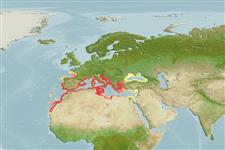| Native range | All suitable habitat | Point map | Year 2050 |

|
| This map was computer-generated and has not yet been reviewed. |
| Spicara smaris AquaMaps Data sources: GBIF OBIS |
Issue
Placement in Sparidae from Centracanthidae from Santini et al. (2014:Ref. 95347). Suggestion already made in Garrido-Ramos et al. 1995;
Hanel & Sturmbauer 2000; Summerer et al. 2001;
Orrell et al. 2002; Orrell & Carpenter 2004; Chiba
et al. 2009; Hanel & Tsigenopoulos 2011.